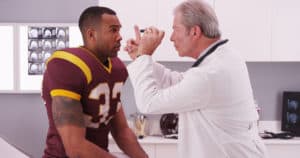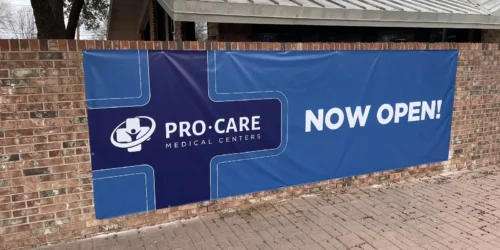
Physical Signs of a Concussion
Some of the most common signs of a concussion are headaches, dizziness, nausea, and confusion. You may even experience a ringing sound in your ears that won’t go away. Other common physical signs of a concussion include blurred vision and drowsiness or fatigue. These symptoms can start after the accident and last for days and even weeks after you hit your head. If you notice headaches that won’t go away paired with blurry vision and other symptoms, this may mean you have suffered a concussion. Other symptoms of a concussion can develop later and last for a while, like feeling sensitive to light and noise, trouble sleeping, and even trouble concentrating or irritability.
Concussion Signs Observed by Others
Some signs you have a concussion after a brain injury can be more easily observed by your family and close friends. When asked for details about how you hit your head, another sign of a concussion is that you might not remember. Loss of memory is common when you’ve hit your head, especially if you also blacked out at any point. While you may not realize you lost consciousness, no matter how briefly, someone who was with you at the time of the accident may be able to report that detail for you. You may also appear dazed, have trouble answering basic questions, or have slurred speech.
Delayed Symptoms of a Concussion
A tricky thing about concussion, like other car accident injuries, can have delayed symptoms. Your specific symptoms and how they show up in the hours and days after the accident can depend on where you hit your head, the force of the impact, and whether or not you have experienced any head injuries before. When you have a severe concussion, the symptoms are more likely to show up right away. With a mild concussion, the symptoms may show up gradually and be less obvious at first. Even mild concussions can lead to a traumatic brain injury, so it is important to seek medical attention immediately after an accident and allow the doctor to determine the severity and evaluate you for a concussion.
Concussion and Brain Injuries
When you suffer a head injury, it can lead to a concussion and also other serious complications, like swelling around your brain or even a brain bleed. Effects on your brain can be life-threatening and should be treated as soon as possible. A concussion is a type of traumatic brain injury and while some concussions are less severe than others, some cognitive effects like confusion and memory loss may be temporary. Headaches after a concussion can last for days to weeks and can continue to affect your coordination and balance and your ability to complete your usual daily tasks.
Evaluation for a Concussion
The medical team at Pro-Care Medical Centers in Austin and San Antonio utilizes a brain scan test that is a combination of neurocognitive tests and an EEG (electroencephalogram) that tests for electrical activity in your brain. This brain scan is completely non-invasive and pain-free, with no needles involved. The goal of the brain scan is to measure your brain’s electrical activity that gives your accident doctor a better picture of your brain activity. The neurocognitive tests assess your memory, mental processing, and reaction times. The combination of results helps your doctor identify any problem areas and develop a traumatic brain injury treatment appropriate for you.
If you are experiencing concussion-like symptoms then the sooner you get an evaluation the sooner you will know whether you need traumatic brain injury treatment. The medical team at Pro-Care will perform the brain scan as soon as possible after the incident and a neuro specialist will help determine the severity of your head injury. Concussion management and treatment for a head injury are essential to you experiencing a full recovery after an accident.



